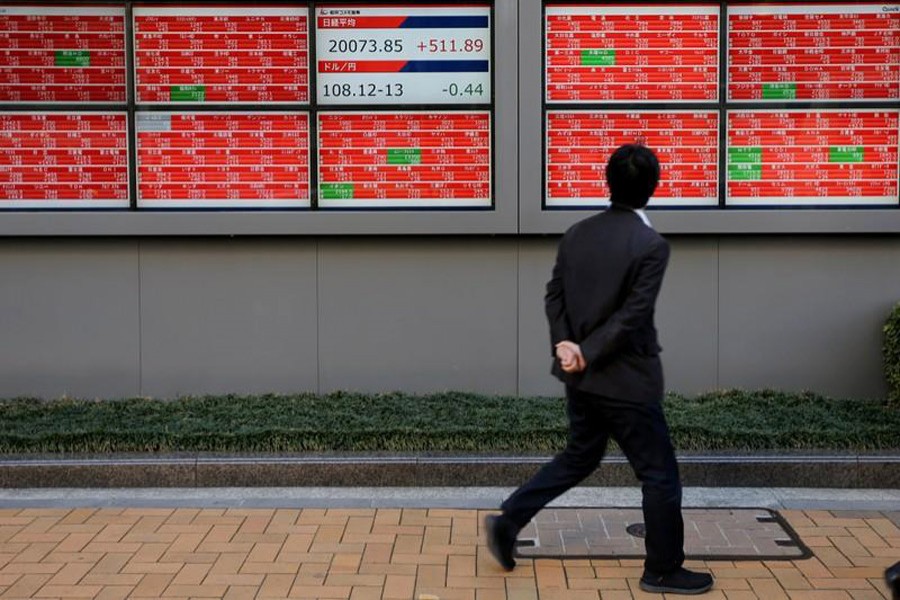Asian shares inched up on Tuesday, with Chinese shares making decent gains after a week-long holiday, though investors remained cautious over US-China trade talks after President Donald Trump said a quick deal was unlikely.
European shares were expected to follow, with major European stock futures including pan-European Euro Stoxx 50 futures trading up 0.15 per cent-0.2 per cent.
Japan’s Nikkei climbed 1.0 per cent while MSCI’s broadest index of Asia-Pacific shares outside Japan rose 0.55 per cent, led by gains in tech shares in South Korea and Taiwan.
South Korea’s Samsung Electronics rose 1.2 per cent after its profit guidance. The semiconductor firm said its third-quarter operating profit likely fell 56 per cent on a downturn in global memory chip prices, but that was better than what analysts had anticipated.
Taiwan’s stock index gained 0.7 per cent to hit five-month highs while Hong Kong shares extended gains after the territory’s leader said she had no plans to use the emergency regulation ordinance to introduce other laws.
Shanghai shares rose 0.6 per cent after the week-long break, though gains were led mainly by defensive shares ahead of the crucial trade talks.
Spending on retail goods and dining during China’s National Day holidays returned to growth this year, offering unexpected respite to an economy that has been expanding at its weakest pace in almost three decades.
Still a private survey showed China’s services sector grew at its slowest pace in seven months in September.
On Wall Street, the S&P 500 lost 0.45 per cent on Monday, unable to sustain gains made after positive tweets and news headlines about the trade talks.
US and Chinese deputy trade negotiators on Monday launched two days of talks aimed at paving the way for the first minister-level negotiations in months on Thursday and Friday.
Mere confirmation of the talks from Beijing has helped to improve the mood, or at least triggered text-reading algorithms to react by buying stocks and the yuan, said some market players.
“There are vague hopes on the upcoming talks. Trump must be yearning for a deal as his re-election prospects could be hurt if the economy keeps deteriorating,” said Yukino Yamada, senior strategist at Daiwa Securities.
But prospects for progress in US-China trade talks dimmed after Washington blacklisted Chinese companies over Beijing’s treatment of predominantly Muslim ethnic minorities.
Among those blacklisted, trading in video surveillance company Hikvision was suspended while voice recognition front-runner IFLYTEK Co fell as much as 3.1 per cent.
Trump also said he hoped China found a humane and peaceful resolution to political protests in Hong Kong, and warned the situation had the potential to hurt trade talks.
The talks are getting underway ahead of a scheduled increase in US tariffs on $250 billion worth of Chinese goods, to 30 per cent from 25 per cent on October 15.
“Since tariffs have been hurting trade, people are hoping Trump may postpone some of the upcoming tariffs. Nevertheless, you can’t ignore that fact that, up until now, the market has underestimated Trump’s determination on tariffs,” Daiwa’s Yamada said.
Trump has said the tariff increase will take effect if no progress is made in the negotiations.
“This ongoing trade-war discussion is a much more secular theme rather than something that is going to be resolved in the next couple of days,” said Maurice Meijers, a fixed-income portfolio manager at Dutch fund manager Robeco in Singapore.
Meijers said he doesn’t expect a sudden massive breakthrough that would give markets reason to rally. “That’s very unlikely, I’ll expect this to be an ongoing theme.”
In the currency market, the Turkish lira steadied after declining more than 2.0 per cent on Monday over concerns about Ankara’s planned incursion in northern Syria.
Trump threatened to destroy Turkey’s economy if Ankara takes a planned military strike in Syria too far even though the US leader himself has opened the door for a Turkish incursion by his decision to withdraw US troop from the area.
The lira traded at 5.837 per dollar, near its weakest level since September 2.
Major currencies were more range-bound.
The euro stood at $1.0973, with its recovery from its 2-1/2-year low of $1.10879 hit a week ago meeting a strong resistance around $1.10.
The dollar traded at 107.40 yen, up 0.15 per cent after having found some support around 106.50 yen in the past few sessions, according to Reuters news agency.
Sterling traded at $1.2290, capped by concerns that sizeable differences between Britain and the European Union remained for striking a Brexit withdrawal deal.
With just 24 days to go before the United Kingdom is due to leave the EU, both sides are positioning themselves to avoid blame for a delay or a disorderly no-deal Brexit.
The yuan gained 0.35 per cent to 7.1269 yuan per dollar, catching up to overseas market moves over the holidays.
US debt yields jumped back as $78 billion in note and bond supply slated for auction this week helped push prices lower after last week’s dramatic rise.
Oil prices rose as unrest in oil-producing countries Iraq and Ecuador raised concerns of supply disruptions.
Brent crude futures rose 0.82 per cent to $58.83 a barrel while US West Texas Intermediate (WTI) crude gained 0.78 per cent to $53.16 per barrel.


